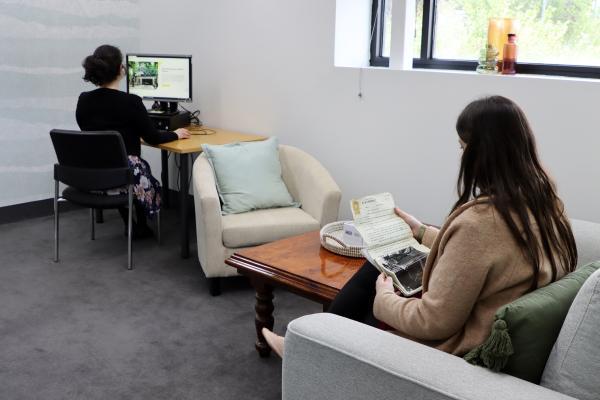Are you feeling upset by the archives you're reading?
Some of the material in Public Record Office Victoria's archival collection contain words and descriptions which may be insensitive and upsetting.
You may find yourself suffering from symptoms of ‘vicarious trauma’ which means to be impacted because of another person’s experience described in the archival records.
This is a common experience during archival research.
What is vicarious trauma?
When we empathise with others, our brains ‘mirror’ their emotional state. While this can be beneficial, as it allows us to understand the subject of the records, the risk is that we ‘take on’ other people’s feelings, including their trauma, as if it were our own.
You may be:
- imagining and then re-experiencing the emotional experience of the person/s in the record
- struggling to get their experience out of your mind
- feeling anger, rage or sadness over their experience
- sadness or guilt because you are safe and happy
- feeling a sense of helplessness and immediate need to contribute to a solution.
What can you do right now to help manage this response?
- Get up and remove yourself and your mind from the records.
- Walk outside to a social space (café, library, supermarket) to detach yourself from the past and return to the present.
- Remind yourself that it’s paper and words, and the person is no longer experiencing this, it is in the past.
- It’s ok to have empathy and understand other’s feelings without falling into those feelings.
- Communicate what you experienced to someone else, which helps separate yourself from it.
- Accept that many realities are tragic, but you have the right to be happy.
- Depersonalise the experience by placing it within the bigger historical picture.
What can I do to manage vicarious trauma as I research?
- Set time limits for exposure to the records: 1 hour a day vs 5 hours a day.
- Read the records away from your home environment to create a physical separation.
- If at the Victorian Archives Centre, you may want to take the records into our 'sanctuary space' for privacy.
- Identify the triggers and remind yourself of the historical context.
- Do some recreation while researching, go for a short walk every hour or half an hour.
- Break up the research with less triggering records to remain focused on the research, rather than the story.
- Arrange to talk to a colleague, friend or associate who will understand what you are doing and regularly catch up about the research and the incidents you are reading about.
You may need professional support if:
- You cannot get the experiences described in the records out of your head when at home.
- You are having recurring dreams or nightmares which include content from the records.
- Feel yourself becoming impatient, intolerant or pessimistic and bitter.
- Have feelings of increasing levels of sadness, depression and despair.
- Have increased your consumption of alcohol or your eating habits have worsened.
- Are unsympathetic to other’s problems which you perceive to be 'trivial' in comparison to what you've read.
- Are avoiding work.
- Are avoiding exposure to records.
- Your emotional state is affecting your relationships.
Remember that putting emotional experiences into words helps to move them from pure emotion to thoughts about emotions. This helps us to digest them and feel more in control.
Here are some organisations which might be able to help you
Relationships Australia:
https://www.relationshipsvictoria.org.au/news/identifying-and-managing-vicarious-trauma-221026/
The following organisations provide free, 24/7 support:
1800RESPECT on 1800 737 732 - National domestic, family and sexual violence counselling; and information and resources for professionals who support people impacted by sexual assault, domestic and family violence.
SuicideLine Victoria on 1300 651 251 - Counselling and support for people at risk of suicide and anyone experiencing mental health issues, as well as workers managing suicidal ideation in clients.
Lifeline on 13 11 14 - Crisis support and suicide prevention services.
Beyond Blue on 1300 22 4636 - Support and advice from a trained mental health professional.
MensLine Australia on 1300 78 99 78 - Telephone support and advice from a trained mental health professional.

